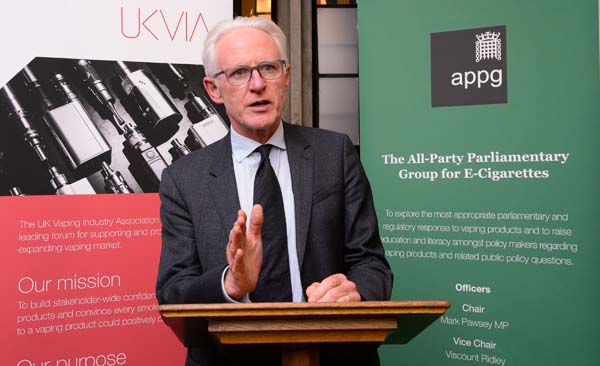Members of parliament chaired three panel discussions as about 160 participants took part in a conference in London yesterday staged by the UK Vaping Industry Association.
Mark Pawsey, the MEP for Rugby and chair for the All Party Parliamentary Group for E-cigarettes, chaired a regulatory-landscape session that was enlivened and overshadowed by Brexit unknowns.
The theme of the conference was, Going for Growth, but considerable time was spent on discussing why e-cigarette growth had faltered and what was needed to get it going again.
Many of the challenges the sector faced were familiar. One such challenge was overcoming the misunderstandings among smokers about the potential health benefits of switching to vaping: misunderstandings in part caused by the over-enthusiastic reporting of the results of poor-quality research into e-cigarettes and vaping.
Other challenges seemed less familiar but no less daunting. Wide product choice, normally seen as being essential in the quest to encourage smokers to switch to vaping, was seen by some as causing confusion and therefore as being a deterrent to switching. This problem seemed to be about the proliferation of versions of a single product, such as is comprised by e-cigarettes, rather than the introduction of different categories of products, such as e-cigarettes, snus and heat-not-burn (HNB) devices.
Gareth Johnson, the MP for Dartford [London] and parliamentary private secretary to the secretary for state for Exiting the European Union, chaired a session on the role of the tobacco and pharmaceutical industries in the future of vaping. This session was almost entirely about the tobacco industry’s role because the pharmaceutical representative who had been scheduled to take part did not. And much of the session involved the tobacco-industry representatives (British American Tobacco, Imperial Brands, Japan Tobacco International and Philip Morris International) trying to explain how they could convince smokers and public health bodies to trust their research given the distrust built up in previous years.
The conference was noteworthy, among other things, for the level of tension in respect of heat-not-burn (HNB) products. Some participants representing e-cigarettes seemed to take the view that HNB products and e-cigarettes should not be too closely aligned. One person questioned whether HNB products were piggybacking on the reduced-harm credentials of e-cigarettes.
The Rt Hon Norman Lamb (pictured), the MP for North Norfolk, chaired a session on bolstering public health evidence. Lamb is a former minister of state for Care and Support at the Department of Health and the chair of the Science and Technology Select Committee. He is leading an inquiry into e-cigarettes that is looking into their effectiveness as a smoking cessation tool and their impact on the health of the nation.
One of the panellists made the point that what was not needed was more research. What was needed was responsible research and the dissemination of the results of that research.
And at this point, as the one-day conference wound down, it was back to where it started: the challenge of addressing misinformation.
A report on the conference is due to be included in a future issue of Vapor Voice magazine.
London vaping conference











